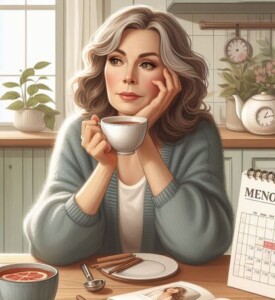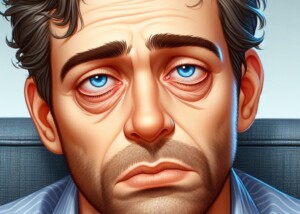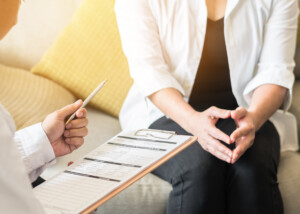
Are you wakened at least twice during sleep by the urge to urinate and are wondering if menopause is the cause?
It’s not normal to be interrupted more than once overnight by the urge to void.
This isn’t even normal during or after menopause.
Often, the cause can be found and a treatment can be put in place.
When a woman reports to her primary care physician or OBGYN that she gets awakened several times a night by the urge to pee — and she just happens to be menopausal — she may hear that menopause is a possible culprit.
Shrinkage of Vaginal and Urinary Tissue from Low Estrogen
“Menopause certainly causes urogenital atrophy,” says Natasha Fuksina, MD, an internal medicine and obesity specialist who combines traditional, integrative and functional medicine to restore health and function.
“Lack of estrogen or decrease of estrogen is thought to be the cause, but exact mechanism is not well-understood,” continues Dr. Fuksina.
“Symptoms of urogenital atrophy include incontinence, urgency, frequency, nocturia [excessive overnight voiding], frequent urinary tract infections as well as vaginal dryness, itching and difficulty or pain with intercourse.
“Although many symptoms are listed, not every woman always experiences all the symptoms.
“Some women never experience, for example, itching or dryness, but experience frequency, nocturia and frequent UTIs.”
If the patient reports that the frequent overnight trips to the toilet have been occurring on a chronic basis, despite attempts to treat this by limiting fluid intake in the hours prior to bedtime, she should discuss the problem with her physician.
The menopausal transition, or the postmenopausal status, may be just coincidences to the actual cause of the nocturia.
The patient needs to wonder if any of the following conditions might be causing her overnight bathroom trips:
- Overactive bladder syndrome
- Interstitial cystitis
- Bladder prolapse
- Vaginal prolapse
- Heart failure
- Kidney failure
- Side effects of a diuretic drug
- Sleep apnea
You’ll note that some of these conditions are very serious. Your doctor may want you to keep a void diary — recording how much urine you expel during your waking hours and how much overnight.
This means collecting your urine in a measuring cup and recording the amount — including overnight.
This will show if your kidneys are producing excessive urine overnight — which can be a symptom of heart failure, kidney disease, sleep apnea or diuretic use.
Obstructive sleep apnea is a common driver behind frequent urination overnight, and the development of this condition may coincide (but not be caused by) menopause.
The bladder is not supposed to fill overnight in the first place. The body is designed to sleep through the night for optimal restoration. pee
Kidney production of urine is thus inhibited.
If a menopausal or postmenopausal woman’s diary reveals only small amounts of urine overnight, but that this produces a strong urge, then there may be an issue with the structure of the urogenital tract.
 Dr. Fuksina is the founder of astraMDhealth, which includes telemedicine. Double board certified in internal and obesity medicine, she focuses on a personalized approach, including metabolism and genetic makeup, to customize treatments and preventive care.
Dr. Fuksina is the founder of astraMDhealth, which includes telemedicine. Double board certified in internal and obesity medicine, she focuses on a personalized approach, including metabolism and genetic makeup, to customize treatments and preventive care.
 Lorra Garrick has been covering medical, fitness and cybersecurity topics for many years, having written thousands of articles for print magazines and websites, including as a ghostwriter. She’s also a former ACE-certified personal trainer.
Lorra Garrick has been covering medical, fitness and cybersecurity topics for many years, having written thousands of articles for print magazines and websites, including as a ghostwriter. She’s also a former ACE-certified personal trainer.
.


























